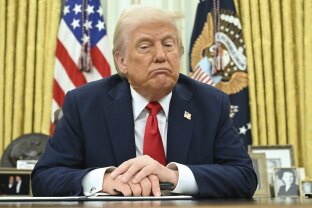President Donald Trump and his former personal lawyer — Alina Habba, now the contested U.S. attorney of New Jersey — have once more been ordered to pay $1 million because of their “sanctionable conduct” in filing a “frivolous” lawsuit against Hillary Clinton.
On Wednesday, an appellate court affirmed a trial judge’s decision that Trump and his legal team wasted the judiciary’s time with a lengthy screed of a lawsuit that rehashed the president’s frustration over the Trump-Russia scandal that dogged his first administration. Trump and Habba had in the past been ordered to pay the money but had avoided it by doubling down in their lawsuit and filing an appeal; they are now back on the hook.
“Many of Trump’s and Habba’s legal arguments were indeed frivolous,” the appellate panel wrote, backing up the lower court’s assessment of the lawsuit.
Habba declined to comment. The White House referred questions to Trump’s personal lawyers, who did not respond to a request for comment.
Trump in March 2022 had Habba file a 108-page lawsuit accusing Clinton and her political advisers of racketeering to gin up what he’s long called “the Russia hoax.” They even dubbed the conspiracy “the enterprise,” saying that it started in April 2015 and “remains ongoing and continuing to the present day.”
U.S. District Judge Donald M. Middlebrooks had none of it. In January 2023, he dismissed the lawsuit in an order that slammed Trump for being “a prolific and sophisticated litigant who is repeatedly using the courts to seek revenge on political adversaries.” The judge ruled that Trump and Habba were “jointly and severally liable for $937,989.39.”
The stunning sanctions order portrayed Trump as “mastermind of strategic abuse of the judicial process,” and said his behavior was unacceptable.
“This case should never have been brought. Its inadequacy as a legal claim was evident
from the start. No reasonable lawyer would have filed it. Intended for a political purpose, none
of the counts of the amended complaint stated a cognizable legal claim. Thirty-one individuals and entities were needlessly harmed in order to dishonestly advance a political narrative. A continuing pattern of misuse of the courts by Mr. Trump and his lawyers undermines the rule of law, portrays judges as partisans, and diverts resources from those who have suffered actual legal harm,” Middlebrooks wrote.
Trump attempted to revive his lawsuit with an amended complaint several months later, this time pointing to a report that had just been released by John Durham, the conservative federal prosecutor whom Trump’s own first administration had assigned as a special counsel to review the origins of the FBI investigation into the 2016 U.S. election interference by Russia.
“It is only recently, in 2022, that the full extent of the defendants’ conspiracy has been unmasked and continues to be exposed by Special Counsel John Durham,” the new version of the lawsuit declared.
But that also failed to convince the trial judge.
Now, the region’s appellate court considered whether the sanctions would hold up. The panel assigned to the case included Chief Judge William Pryor Jr., a George W. Bush appointee; Judge Andrew Brasher, selected by Trump during his first term; and Judge Embry Kidd, appointed by Joe Biden.
In one part of the opinion, Pryor acknowledged that Durham’s findings did lend some credibility to the notion that Clinton and her political brigade had a hand in spreading the idea that then-candidate Trump was somehow colluding with Russian state interests.
“We do not doubt that, in the light of the Durham Report, President Trump has concerns about some defendants’ conduct during the 2016 election. The investigation by Special Counsel Durham found that some defendants played a role in orchestrating unverified allegations of him colluding with Russia,” Pryor wrote.
“Yet, those findings do not cure the deficiencies in Trump’s racketeering claims,” he continued.
All three appellate judges rejected Trump and Habba’s arguments as a “shotgun pleading.”
“The release of a long-expected report is hardly extraordinary, especially when the movants fail to identify a single material fact in the report previously unknown to them,” Pryor wrote.
This $1 million sanction is one of the only pending claims against Trump that continues to survive court review. The other is an $83 million judgment against him for defamation claims by journalist E. Jean Carroll that was affirmed on appeal.
Meanwhile, Habba is fighting for her job after a federal judge in Pennsylvania ruled she was unlawfully appointed as the top prosecutor in New Jersey. She also faces a bar investigation in her home state over her treatment of a former client who was also an employee at Trump’s Bedminster golf club — a probe that could put her professional credentials at risk.
Sign in
Log into your free account with your email. Don’t have one?
Check your email for a one-time code.
We sent a 4-digit code to . Enter the pin to confirm your account.
New code will be available in 1:00
Let’s try this again.
We encountered an error with the passcode sent to . Please reenter your email.


